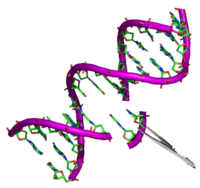
Photo from wikipedia
Short interfering RNA (siRNA)-based therapy has a high potential for application in cancer gene therapy. However, delivery of siRNA to target cells is limited by many factors such as serum… Click to show full abstract
Short interfering RNA (siRNA)-based therapy has a high potential for application in cancer gene therapy. However, delivery of siRNA to target cells is limited by many factors such as serum ribonuclease (RNase) degradation, off-target effects, and inadequate cellular uptake. In this study, an enzyme-response PEG/Lipids/calcium phosphate hybrid delivery system was constructed for siRNA. The nearly neutral charged siRNA@NP2 was resistant to serum-induced degradation. Compared with the non-enzyme-response siRNA@NP1, siRNA@NP2 had efficient delivery in both SMMC-7721 cell lines and SMMC-7721-bearing nude mice. Moreover, safety evaluation of the nanoparticles revealed that they had no significant toxicity both in vitro and in vivo. The developed siRNA@NP2 delivery system presents an efficient tool for siRNA-based cancer gene therapy in vivo.
Journal Title: Journal of biomedical nanotechnology
Year Published: 2018
Link to full text (if available)
Share on Social Media: Sign Up to like & get
recommendations!